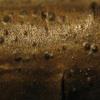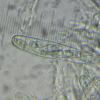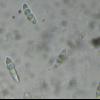
29-11-2024 21:47
Yanick BOULANGERBonjourJ'avais un deuxième échantillon moins mat

27-02-2026 17:51
 Michel Hairaud
Michel Hairaud
Bonjour, Quelqu'un peut il me donner un conseil p

27-02-2026 16:17
 Mathias Hass
Mathias Hass
Hi, Found this on Betula, rather fresh fallen twi

27-02-2026 12:56
Åge OterhalsFound on fallen cones of Pinus sylvestris in midle

27-02-2026 11:21
 Yannick Mourgues
Yannick Mourgues
Hi to all. Here is a specie that can may be relat

26-02-2026 15:00
Me mandan el material seco de Galicia, recolectada

24-02-2026 11:01
Gernot FriebesHi,found on a branch of Tilia, with conidia measur

23-02-2026 11:22
Thomas Læssøehttps://svampe.databasen.org/observations/10584971
Dark spots on Caragana
Marja Pennanen,
11-01-2015 16:16
these about 0,2 mm wide spots on Caragana turned to be pyrenomycetes.
They are much wider than high and seem to grow under the outermost layer of the bark.
The spores are at least now hyaline, 18-24x4-6 and contain 4 droplets.
The asci are about 70-120x9-12.
Help with the determination is truly welcome: Marja
Alain GARDIENNET,
11-01-2015 22:02
Re : Dark spots on Caragana
Hi Marja,
Probably an Arthopyrenia species.
Alain
Marja Pennanen,
12-01-2015 13:44
Re : Dark spots on Caragana
Cher Alain,
merci!
So, it may be a lichen. This is an interesting piece of information for me.
I have thought, that lichens grow on a surface not under it...
Marja
merci!
So, it may be a lichen. This is an interesting piece of information for me.
I have thought, that lichens grow on a surface not under it...
Marja
Björn Wergen,
28-01-2015 12:30

Re : Dark spots on Caragana
Hi Marja,
indeed Arthopyrenia. This genus belong to a group of lichens called "pyrenocarpous lichens", because they simulate pyrenomycetes fruitbodies. They occur on the bark of various deciduous trees, in my region Arthopyrenia cinereopruinosa is commonest.
regards,
björn
indeed Arthopyrenia. This genus belong to a group of lichens called "pyrenocarpous lichens", because they simulate pyrenomycetes fruitbodies. They occur on the bark of various deciduous trees, in my region Arthopyrenia cinereopruinosa is commonest.
regards,
björn


